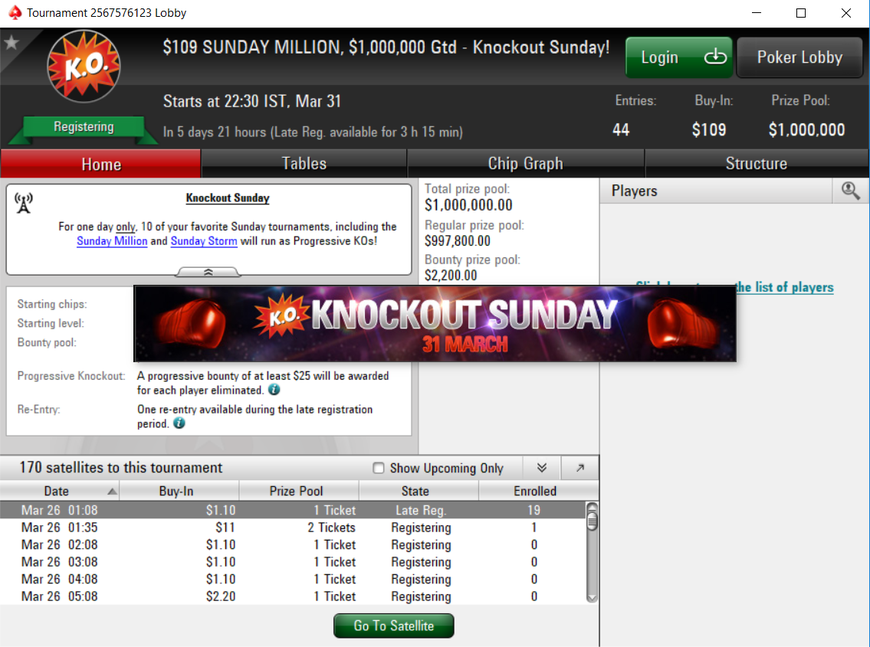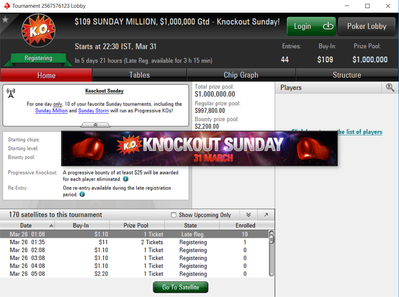

On March 31, PokerStars will be running a special one-off promotion, “Knockout Sunday,” in which ten of the Sunday major tournaments, including the flagship Sunday Million and Sunday Storm, will be played in the progressive knockout (PKO) format.
This means that for the first time in the history of the Sunday Million, the iconic tournament will utilize the increasingly popular and action-packed PKO format.
Progressive Knockout tournaments, also called bounty tournaments, play similarly to regular knockout tournaments, where typically 50% of the buy-in goes into the prize pool and the other half funds a bounty on each player’s head. But in PKOs, each time a player is eliminated, half of that player’s bounty is added to the bounty of the winner of the knockout hand with the other half awarded as the bounty. This allows players the chance to win large sums of money even before a tournament gets in the money (ITM).
 Sign Up Today »
Sign Up Today »
- Largest player base in the world.
- Home of Spin & Go, Power Up and lots of other unique game variants including 6+ Hold’em.
- Biggest weekly tournament schedule around.
Along with the Sunday Million and Sunday Storm, eight more tournaments including the $215 buy-in *Sunday Warm-U*p, the $22 Mini Sunday Million, the Sunday Kickoff, and the Supersonic tournaments will be a part of the Knockout Sunday promotion.
However, the operator has specifically emphasized that the tournaments will be played with bounties “for one day only.” These tournaments will return back to their original format the following Sunday.
“For one day only, 10 of your favorite Sunday tournaments, including the Sunday Million and Sunday Storm will run as Progressive KOs!,” it is stated in the tournaments’ description.
Over the past few years, knockout or bounty tournaments have significantly increased in popularity, especially among recreational players due to the format’s intriguing concept. There has been an increased focus on the format across the industry.
Last year, 888 and iPoker introduced PKO tournaments; PokerStars ran its first-ever PKO exclusive Bounty Builder Series in October; and partypoker expanded its weekly schedule of PKOs and has also been running Knockout Series.
The experimentation of introducing a bounty format comes at a time when PokerStars recently halved the buy-in of PokerStars’ longest-running tournament, the Sunday Million, to $109 from its traditional $215 price point. The room is also gearing up to run the 13th-anniversary edition of the Sunday Million with a $10 million guaranteed prize pool on April 14. However, for this particular occasion, the buy-in will return to $215.
First introduced in 2006, the Sunday Million is touted as the world’s biggest weekly poker tournament running every Sunday for 13 years. According to the operator, the Sunday Million has run more than 600 times and has awarded over $750 million. It drew its biggest field back in December 2011, six months after Black Friday, when PokerStars celebrated its 10th anniversary by guaranteeing $10 million to its flagship weekly event.
The December 2011 event attracted 62,116 players to generate a prize pool of $12.4 million—the biggest ever in the history of the Sunday Million. It also held the record for biggest online poker tournament for almost a decade until recently when partypoker broke the record by successfully hosting a $20 million guaranteed tournament.
Not just PokerStars, but other operators have been experimenting with their Sunday tournament offerings too. For the past few weeks, 888Poker has been running special promotions on Sunday almost every week. First, the room introduced its “Sunday Sale” tournaments in which some of the Sunday major tournaments saw their buy-ins cut in half, but they retained the same guarantees.
This was followed by another innovative promotion called “RakeLESS Sunday” where seven of the Sunday majors had their rake removed. Last Sunday, the room came up with another novelty concept, called Rake or Break tournaments. In these tournaments, there is no guaranteed prize pool, instead, a target prize pool is set. If the tournaments fail to reach its target prize pool, every player who played the tournament gets the rake refunded.
Fortunately for players, the first-ever Rake or Break tournament with a buy-in of $320 fell short of its $100,000 target prize pool, ultimately turning the tournament into a rake free event. Every player who paid the rake was refunded $20.

